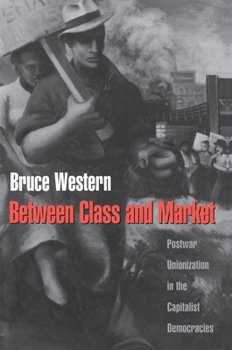Between Class and Market: Postwar Unionization in the Capitalist Democracies
Select Format
Select Condition 
Book Overview
In the United States, less than one worker in five is currently in a labor union, while in Sweden, virtually the entire workforce is unionized. Despite compelling evidence for their positive effects, even the strongest European unions are now in retreat as some policymakers herald the U.S. model of market deregulation. These differences in union power significantly affect workers' living standards and the fortunes of national economies. What explains the enormous variation in unionization and why has the last decade been so hostile to organized labor? Bruce Western tackles these questions in an analysis of labor union organization in eighteen capitalist democracies from 1950 to 1990. Combining insights from sociology and economics in a novel way, Western views unions as the joint product of market forces and political and economic institutions.
The author argues that three institutional conditions are essential for union growth: strong working-class political parties, centralized collective bargaining, and union-run unemployment insurance. These conditions shaped the impact of market currents and explain variations across industries, across countries, and over time for the four decades since 1950. Between Class and Market traces the story of the postwar labor movements supported by a blend of historical investigation and sophisticated statistical analysis in an innovative framework for comparative research. Western tightly integrates institutional explanation and comparative method in a way that balances comparative generality with the unique historical experiences of specific cases.





